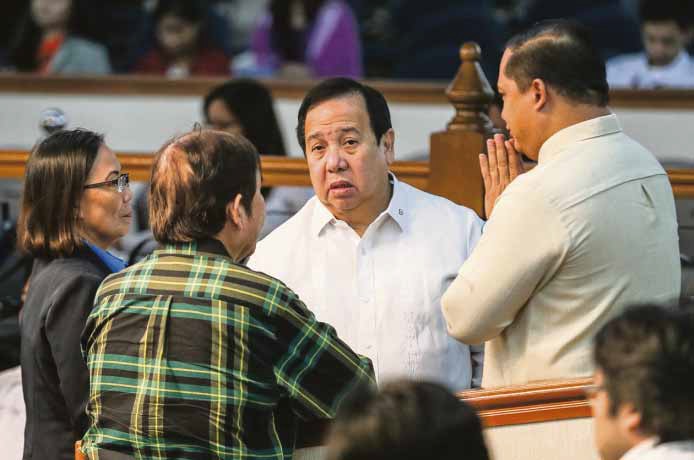Death penalty: PH told to honor int’l treaty
Opposition senators on Tuesday forced the suspension of discussions on President Duterte’s proposal to revive the death penalty, citing international treaty obligations.
Sen. Richard Gordon, chair of the Senate committee on justice and human rights, called off the panel discussions indefinitely until Justice Secretary Vitaliano Aguirre II issued an opinion on whether the Philippines could opt out of the International Covenant on Civil and Political Rights and the 2nd Optional Protocol that were ratified under the administrations of Ferdinand Marcos in 1986 and Gloria Macapagal-Arroyo in 2007, respectively.
Aguirre was absent during the first hearing on six bills that would restore the death penalty.
But Aguirre said in an interview with reporters: “A treaty is subservient or lower than a constitutional provision. The Constitution allows us to reimpose the death penalty. The treaty cannot prevail over the Constitution.”
For Senate President Pro Tempore Franklin Drilon, however, the death penalty bill just “died” after the hearing.
Article continues after this advertisement“It is very clear that we cannot revive the death penalty because of our treaty commitment. A treaty is part of the law of the land and this had been ratified by the President, and concurred to by two-thirds of the Senate,” Drilon said, adding that he did “not know how the government could justify the passage of the death penalty bill in the face of this clear international treaty obligation that we cannot impose the death penalty domestically.”
Article continues after this advertisementThe 1987 Constitution, Drilon said, “adopts the generally accepted principles of international law as part of the law of the land.”
He pointed out that some lawyers during the hearing averred that the 2nd Optional Protocol “did not provide for any withdrawal or derogation mechanism, which means the party cannot reinstate the death penalty without violating the law.”
No withdrawal
Senior State Prosecutor Richard Fadullon told the hearing that while the country wanted to honor its international commitments, “there are certain needs that are peculiar to our country that we have to look into and address.”
Fadullon acknowledged that a treaty ratified by the Senate was a law and that President Duterte would violate the law if he did not honor that treaty.
This prompted Drilon to call for the suspension of the hearings so the government could repeal the treaty first. Sen. Panfilo Lacson agreed.
Sen. Leila de Lima said: “Treaties which do not have provisions on withdrawal or denunciation cannot be denounced or be withdrawn from.”
After the hearing, Drilon said the country could face international repercussions if it failed to honor its treaty obligations, citing as example the possibility that the European Union could review the no-tariff benefit extended to Philippine products.
Gordon later told reporters, “There is no ironclad law, it can be changed.”
An opponent of the death penalty, Gordon said he and Senate President Aquilino Pimentel III had made a head count of senators and found that only 10 of the 24-member Senate favored its revival.
Good chance
Senate Majority Leader Vicente Sotto III said there was a good chance the proposed measure would pass Congress if the lawmakers limited the imposition of the death penalty to high-level drug trafficking.
Six bills would restore the death penalty for heinous crimes, such as drug trafficking, kidnapping, child trafficking, exploitation, prostitution and rape.
While a similar proposal is undergoing plenary discussions in the House of Representatives, the Senate has still to muster a consensus on the key component of President Duterte’s war on illegal drugs.
The revival of the death penalty was not among 39 priority bills tackled during the Legislative-Executive Development Advisory Council meeting last week.
Asked to comment, Sen. Manny Pacquio, a proponent of the death penalty, said treaty obligations should not get in the way of the measure, a key component of Mr. Duterte’s war on drugs.
“These international treaties cannot affect our Constitution, which makes an exemption to heinous crimes so that we can impose death penalty… . This death penalty we are pushing for is constitutional,” Pacquiao said.
Impact on OFWs
Government security agencies favored the revival of the death penalty, saying this was necessary given the rate of heinous crimes in the Philippines.
But in a position paper, Human Rights Commissioner Karen Gomez-Dumpit said: “To reimpose the death penalty is a breach of international obligation by virtue of our bounden commitments with international human rights and treaties and our adherence to the principle of pacta sunt servanda (agreements must be kept) rule.”

AMNESTY INT’L LAWYER Sen. Richard Gordon talks to lawyer Romeo Cabarde (right) of Amnesty International, which investigated the spate of extrajudicial killings in President Duterte’s war on drugs, during a Senate hearing on the proposed restoration of the death penalty. —LYN RILLON
The Department of Social Welfare and Development (DSWD) called the death penalty “cruel, degrading and inhuman” and that it “goes against the right of individuals to life.”
Undersecretary Maria Lourdes Turalde-Jarade, in presenting the DSWD position, said the measure was “antipoor” given the country’s “expensive and delayed justice system.”
“The reintroduction of death penalty would not only set the country against its international commitments, but would [also] seriously undermine its positive track record of advocating for the commutation of the death sentences imposed on Filipino nationals abroad,” Romeo Cabarde, vice chair of Amnesty International-Philippines, told the Senate.
He said 88 overseas Filipino workers (OFWs) were on death row in different parts of the world as of April 2015, citing figures of the Department of Foreign Affairs.
Other resource persons at the hearing pointed out that the Philippines would lose its moral standing in pleading for the lives of these OFWs if it reimposed the death penalty at home.
Ramon Casiple of the Institute of Political and Electoral Reform said the death penalty had not deterred the commission of heinous crimes.
“They will happen as they will happen… Whether or not death penalty is imposed, these crimes will happen,” Casiple said.